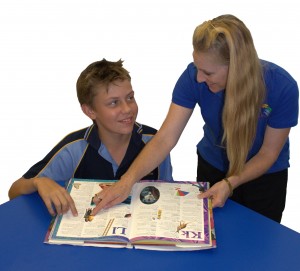
Language skills have a big impact on school achievement. Whether you are a parent wanting to help your child with homework, a teacher wanting to support a language disordered student in your class or a school support worker wanting to help out a student in your care here are some support strategies for middle primary and older students with language difficulties.
Students with language difficulties can benefit from support to cope with the demands of communicating and learning both at home and school. A formal language assessment by a qualified and experienced speech pathologist will provide specific strategies for a student’s individual needs. Here are some ideas which may be helpful:
Provide an optimal learning opportunity by:
- Providing opportunities for quiet focussed individual work as the language demands of the classroom are tiring for a child with language learning difficulties.
- Encouraging the student to take their time. Students can be impulsive and ‘rush into’ tasks. Encourage careful thinking about tasks before attempting them.
- Providing opportunities for some work to be completed with other students who are able to be good role models for language and communication.
- Providing opportunities for the student to discuss their understanding of information and tasks before completing them.
- Providing opportunities for the student to share the drafts of their work before completing them.
Optimise student's ability to listen by the following:
- Reducing visual distractions such as not having student sit by windows, doors or corridors. Seating near the front of the class helps with focus and attention.
- Reducing noise distractions such as by sitting student away from noisy students, corridors air-conditioners etc.
- Gaining the student's attention before giving instructions.
- Giving short simple instructions.
- Emphasising key words.
- Breaking complex instructions down into parts or steps.
- Repeating instructions to the student individually if required.
Provide visual supports whenever possible, such as :
- Providing maps, diagrams, pictures or video were possible.
- Writing keywords on the board.
- Providing a demonstration of tasks.
- Providing opportunities for hands-on activities were possible.
- Providing checklists or outlines for tasks.
Facilitate the students understanding of information presented by:
- Pre-teaching new vocabulary and concepts before presenting a unit of work.
- Highlighting key words and concepts.
- Linking new information to known information.
- Providing opportunities for repetition as required.
- Allowing extra time to process the new information or concepts.
Facilitate the students presentation of information by:
- Providing lists of key vocabulary.
- Linking new information to known information.
- Encouraging the student to use text maps, graphic organisers and minds maps to plan texts.
- Encouraging the student to talk through information before recording it.
- Encouraging the student to brainstorm, plan, draft and edit work.
- Using technology and/or scribes were needed.
- Considering the use of voice to text technology
- Using alternative forms of presenting work of such as oral presentations, models, posters, timelines, PowerPoint presentations, recorded information.
Facilitate the student’s use of correct language structures by:
- Explicitly teaching the structure of written texts.
- Explicitly teaching structure of sentences and the use of grammatical structures.
- Teaching verb tenses and conjunctions which are often structures students find particularly difficult. They may benefit from repetitive activities such as a sentence completion tasks to develop competence with these.
- Encouraging students to read their own work out loud. This often makes grammatical errors easier to detect.
- Encouraging students to draft and edit their work. Encourage them to seek feedback at the editing stage.
- Developing the student's ability to use a word processor with spelling and grammar checks.
Develop the student's ability to use independent strategies such as:
- Checking their work for text structure, spelling and grammar as well as meaning.
- Using a dictionary to check unfamiliar words.
- Using a thesaurus to develop vocabulary.
- Requesting clarification as needed.
- Using a buddy for support as needed.
- Using note taking, planning and drafting skills.
- Producing a draft of work and asking for feedback prior to presenting a final copy
For more information on supporting students with special needs check Our website, and to keep up to date like us on Facebook, follow us on Twitter and pintrest. For more information on how speech pathology assessment and therapy can help students with literacy difficulties click these links.
Related Blog Posts
If you liked this post you may also like:
Boost brain power!
Developing play
Supporting students
Starting school



